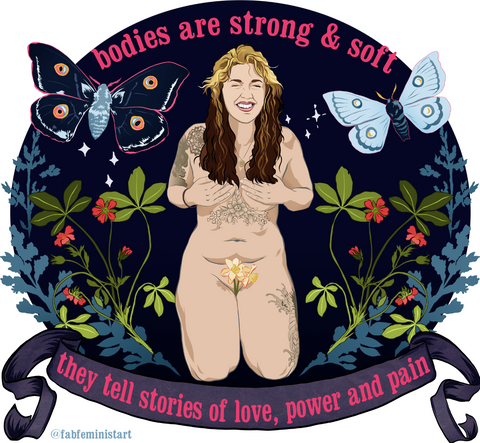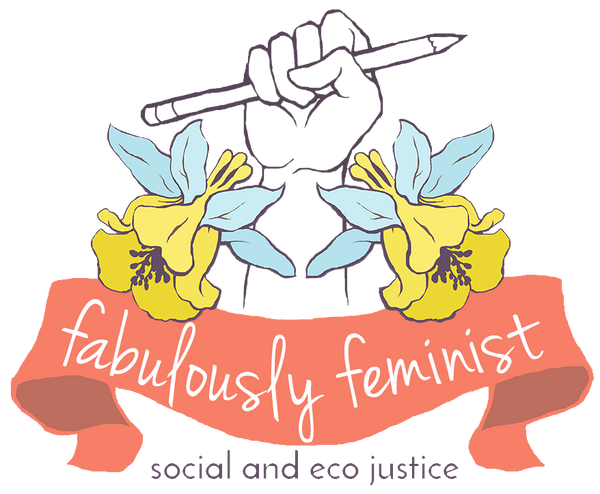All Bodies Are Good Bodies: A Series In Collaboration
This is a new series of body-affirming illustrations I began in May of 2020.
Each illustration is created in partnership with the Participant, including selecting the photo to be illustrated, getting feedback on the artwork, selecting flowers/plants and a body-affirming quote or message.

Bodies Are Strong & Soft They Tell Stories Of Love, Power and Pain. A collaboration with Shelby Beyler of The Botanist Rochester.
You can support this project by purchasing a print, and/or reaching out to be illustrated.
Goals of this project:
🌻 To be in relationship with my community members and fellow changemakers, prioritizing QTBIPOC and disabled folks.
🌻 To honor and to recognize the various relationships we have with our bodies, without judging those relationships.
🌻 To approach the final artwork as a collaborative piece, wherein the person represented in the image has full say over how their body is represented, and the quote or phrase used in relation to the illustration. In this process I will maintain full transparency of what the artwork looks like from start to finish.
🌻 To provide equitable access and rights to the final image, meaning that I as the Artist, and all Participants have full rights to use the artwork for personal and commercial use, so long as we both credit one another (artist and person in the image) in all contexts.
- While Participants access a non-exclusive commercial license to use the artwork, I as the Artist, retain the copyright. Learn more about image licensing here.
- A Participant credit looks like: "This body-affirming illustration was created in partnership with Veronica Campos (depicted in the illustration) https://www.instagram.com/veroocampos/ as part of my series of illustrations on body acceptance/positivity. Learn more here: https://fabulouslyfeminist.com/pages/all-bodies-are-good-bodies-a-series-in-collaboration" (Participants can determine which weblink they would like included in credits. Example here)
- An artist credit looks like: "Original artwork created by Callie Garp of Fabulously Feminist, fabulouslyfeminist.com" My copyright signature must also be retained in the image, however it is used.
🌻 To maintain full transparency of how the artwork may be used now and in the future. I will get written consent from all Participants before using their illustration in any future endeavors not explicitly outlined in our agreement, such as art installations, book projects, free digital downloads etc.
🌻 How this artwork will be used right now:
- The illustration will be posted on my Instagram account and my Facebook page and will include the original photo in the post. Participants will be tagged in the photo and the description.
- If participants consent, this Instagram post may be boosted using a paid ad through the Instagram platform.
- The illustration may be included on products (such as prints, shirts, mugs) on my website and etsy shop. Participants will be fully credited in the descriptions, and an explanation of the project will be included. (An example can be seen here).
- As a self-employed artist, it takes significant time and energy to create a customized portrait like this. Any potential revenue gained from these illustrations helps to offset the costs of the project and allows me to continue the work.
- As stated above, all participants have equal right to use the illustration for personal or commercial ventures, so long as I am credited as the artist.
🌻 To broaden the discussion around what body positivity and body acceptance mean & look like, in order to better engage with intersections of identity, especially as they relate to racism, ableism and heterosexism.
🌻 To support and uplift the important social justice work BIPOC and disabled people are doing.
How it works:
🌻 First, we agree on a photograph to illustrate (you must have the photographer’s permission/release).
- This photograph should be an image that best depicts how you would want to be portrayed in the world, especially as you relate to the idea of body acceptance/body positivity.
- I personally prefer more full-body shots, in relation to the subject of the series, but we can review any/all photos you'd be interested in having illustrated.
🌻Next, I illustrate the photo and keep you updated in the process, because I think it’s important for people to consent to how their bodies are being represented.
🌻 You can provide feedback on what sorts of plants or flowers are meaningful to you & you would prefer to have in the illustration.
🌻 As I near the end of the illustrating process, we agree on a body affirming quote to go with the illustration. You review and give feedback on the final draft of the piece.
🌻 After the piece is done you receive a digital copy of the illustration for personal and commercial use (I retain the full copyright -- see above for full details, and please ask any questions for clarity).
🌻 If you have any thoughts or questions about this project, let’s talk! Email me directly at calliegarp @ gmail.com or DM me on Instagram
Why This Project:
In 2015, I dedicated my master's degree to exploring exchanges in art, and equitable art ethics. (To learn more about these ideas, check out this book). Although I am trained as an oil painter, I feel that the history of oil painting, and the classist dynamics that are in the room the moment you are addressing the oil painting as 'object', can get in the way of equitable art, especially for a white artist. I am also uncomfortable with the global art market as it stands right now. I believe it is geared towards wealthy white men, and is a system that consumes less privileged art/artists for their benefit. [While this is a highly simplified summary of my feelings on the matter, I imagine I'll be following this up with some blog posts/articles in the future].
All this in mind, after I attained my MFA, I chose to move forward in my career with illustration art as a vehicle to make art that was ethical (or more ethical) and (more) accessible.
As a fat, queer woman with chronic pain and health problems, I have been brewing over the idea of creating a series of work addressing the relationships we have with our bodies for some time now, and a recent traumatic experience in the medical industrial complex significantly impacted my mental and physical health. As I considered this potential series of work, I felt that if I was going to focus on a body acceptance /affirming work, it should also directly engage with other people and their experiences.
I understand that de-centering whiteness in self care, mental health, body positive/affirming space is vital, and as a white woman, I strive to figure out best practices, while not gaining ally privilege. I know I am going to mess up, and I am going to hold myself accountable. However, not making the work for fear of messing up doesn't feel like the right choice. I can't be just another white feminist artist making art about 'loving yourself' -- because the default 'yourself' is always going to be a cis white woman in those spaces, at least until we are consciously making the effort to make those changes.
I recognize that the history of the white artist/authority and the 'subject', especially when the 'subject', is a person of color and/or has multiple marginalized identities, is so fraught. And, that history is still very relevant. Although I could have set out to create a series of work based on non-specific people, in reflecting on my own values as an artist and a human in the world, I did not want to create work for a white audience (as a white artist) including and about BIPOC, (thus gaining ally privilege) and not directly uplifting people of color.
I believe that having an affirming portrait of yourself can be a political act, and creating that artwork in collaboration can be an act of activism.
Finally, as a self employed artist, I am constantly navigating the devaluation of my creative labor -- from people claiming that art is worthless, to people illegally stealing and profiting off my work. I spend a significant amount of time sending DMCA notices, and Cease and Desist letters, as well as paying a lawyer to address instances of theft where I am personally unsuccessful in getting the work taken down. A great deal of time and attention is spent addressing theft rather than creating work (or having something that remotely resembles a work-life balance). So, figuring out what an equitable exchange is between an artist - especially a white artist- and a participant that values both our time and resources can be really challenging.
My goal is that in providing a high res file to participants for personal and commercial use, I am putting just as much trust and support in everyone who is in this project, as they are putting in me. Through these conscious choices I strive to mitigate systems, which might otherwise tokenize, objectify or exploit participants, especially BIPOC.

I Am Not Brave For Loving My Body. A collaboration with Veronica Campos.
I’m selecting people to work with on an individual basis and am prioritizing QTBIPOC, especially changemakers and activists for the series. If you’re interested or know someone who might be, feel free to reach out!
